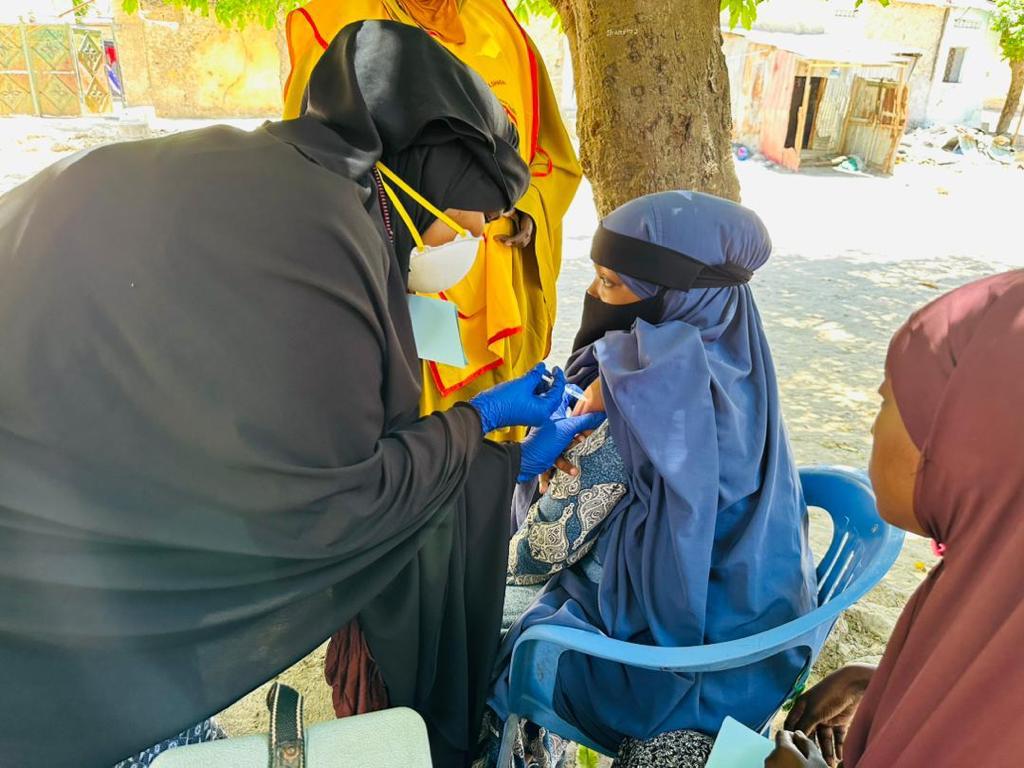
USAID’s support contributed to fully vaccinating 47% of eligible Somalis with the COVID-19 primary series vaccines. Credit: WHO/Somalia
Mogadishu, 9 September 2023 – Nearly 47% of the eligible Somali population (1) are now fully vaccinated against COVID-19, thanks to the successful collaboration between the World Health Organization (WHO), Federal Government of Somalia and the United States Agency for International Development (USAID) under the COVID-19 response in Somalia project. This project was implemented from July 2022 to July 2023, by the Somali Federal and state-level ministries of health with the technical support of WHO and USAID and aimed to strengthen health care systems and train community health care workers as part of an integrated vaccination campaign for COVID-19 and other vaccinations covered under the Expanded Programme on Immunization (2). By the end of June 2023, Somalia had administered a total of 10 527 700 doses of COVID-19 vaccines (64.4 doses of primary series COVID-19 vaccines per 100 people) — one of the highest vaccination rates in Africa (3).
“Considering the fragility of our health system, achieving such a high rate of the primary COVID-19 vaccination series in Somalia is no small accomplishment,” said Dr Mukhtar Abdi Shube, the Head of Vaccines and Immunization Programme at the Federal Ministry of Health. “It puts Somalia on par with the more stable and advanced countries in Africa and elsewhere. The project helped address existing gaps in our immunization services and infrastructure, such as coordination, surveillance, shortage of vaccinators, and an operational response to COVID-19,” he added.
The COVID-19 response project worked with the Somali Federal and state ministries of health to ensure that the most vulnerable and hard-to-reach populations would be reached with the COVID-19 vaccination campaign. Under this project, nearly 2000 community health workers were trained and deployed in 71 high-priority districts, including 31 drought-affected districts. The community health workers made house-to-house visits in marginalized settings, conducted case detection and contact tracing for COVID-19, and identified people, especially female household members, who needed to be vaccinated and refered them to nearby outreach teams set up at community centres for COVID-19 vaccination. In addition, more than 85% of the vaccinators for the community outreach teams deployed by the COVID-19 response project were women. This gender focus helped increase the vaccination rate for women from 19% (at the start of 2022) to 44% (in July 2023). The COVID-19 response project also helped fully vaccinate 57% of the nearly 3 million internally displaced persons (IDPs) in Somalia and 21% of its nomadic populations.
“This collaboration between WHO and USAID not only contained transmission of COVID-19 in Somalia, but improved coverage for other critical vaccinations,” said Ted Lawrence, USAID Somalia’s acting Mission Director. “By focusing on community-based initiatives, this project helped build a more resilient health system that is better prepared for future health emergencies.” The stronger immunization system also enabled Somalia to roll out supplementary immunization targeting children who had never received critical childhood vaccinations. This contributed to over 84 600 zero-dose children being identified and receiving their first dose of vaccines (BCG, diphtheria-tetanus-pertussis and polio vaccine).
For additional information, please contact:
Kyle DeFreitas
WHO External Relations Officer
Fouzia Bano
WHO Communications Officer
Sila Kimanzi
USAID Somalia Maternal, Child Health, Nutrition and Family Planning Specialist
Danielle Botti
USAID Somalia Development Outreach and Communications Specialist
Keisha Herbert
USAID Somalia Program Office Deputy Director
Related links
1. People at least 18 years old and with no disqualifying health conditions were eligible for COVID-19 vaccines in Somalia.
2. Routine vaccination includes tuberculosis, polio, diphtheria, pertussis, tetanus, Hib pneumonia and meningitis, measles, hepatitis B and pneumococcal pneumonia.
3. In addition to fully vaccinating nearly 47% of the eligible population, through this project an additional 11% of the population received at least one dose of a COVID-19 vaccination series, and 28 000 people received booster doses of a COVID-19 vaccination.


